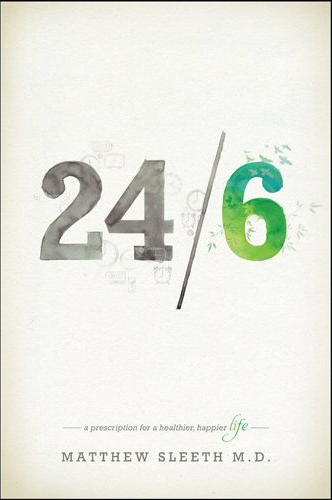
I have a confession: after boldly trumpeting here on the blog that I don't turn on my computer from Saturday night to Monday morning, this weekend I violated my own rule. (It was the Olympic Games, see, and I was desperate to know how the gymnastics competition was going, see . . . .) And you know what? I don't feel very rested this week. Matthew Sleeth's forthcoming book 24/6 (out in November) explains this emptiness, arguing that the Sabbath isn't a luxury but a necessity.
Oh. I guess I needed a reminder.
24/6 is a very good book. Sleeth, a doctor, shares a lot of stories from his medical practice, which I enjoyed. He has a down-to-earth writing style that many readers will identify with.
Some portions of 24/6 look at how to establish a rhythm of Sabbath rest, including unplugging, having retreats, being out in nature, etc. We've talked here about some of those strategies throughout this month of focusing on the Sabbath. (It turns out that Sleeth, like me, has the tradition of a special “Sunday book” that's only read on that day.)
Apart from the helpful and concrete how-to suggestions, though, Sleeth's primary concern is always why we're told to keep the Sabbath. There are all kinds of very human reasons that regular rest helps us be happier and healthier, as the subtitle promises. Keeping the Sabbath reduces stress, allows for deep thought, creates needed social time with family and friends, etc.
But there's an important theological point too: the Sabbath teaches us how to be more like God. Sleeth writes:
…something very important about the character of God is revealed: God stops.
Stopping is a problem for humans. We get a comfortable house, and then want a bigger one. We get enough to eat, and then we want more.
God doesn't need to rest after creating the universe because he's tired. He rests because he is holy, and everything that God does is holy. God rests. God is holy. Therefore, rest is holy. It's simple math.
Rest shows us who God is. He has restraint. Restraint is not doing everything that one has power to do. We must never mistake God's restraint for weakness. The opposite is true. God shows restraint; therefore, restraint is hold. (pp. 27-28)
So this weekend I'm redoubling my efforts to exert no effort.




